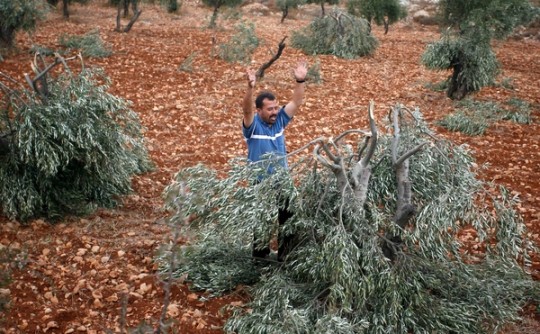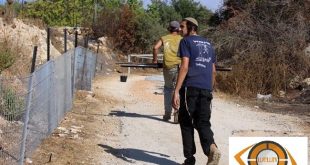The human rights organization Yesh Din today published updated figures highlighting the failure of the Samaria & Judea District Police to investigate incidents in which olive trees and other fruit trees belonging to Palestinians in the West Bank are cut down, torched, vandalized, and stolen. This year’s olive harvest has just begun, and during the first few days of the season, incidents of damage to trees have already been documented (including the cutting down of dozens of trees in Aqraba, Burin, and Yasuf).
Between 2005 and September 2014, Yesh Din documented 246 incidents in which complaints regarding deliberate damage to fruit trees in the West Bank led to the opening of a police investigation. This does not account for all such incidents, but only those brought to the organization’s attention and processed by it. Of 246 investigation files opened by the SJ Police District between 2005 and 2014 and monitored by Yesh Din, just four have ended in indictment; 223 files were closed in circumstances pointing to investigative failures. This represents 96.6 percent of the files in which processing has been completed and where the outcome is known to Yesh Din. The figures show that the ability of the SJ Police District to identify and prosecute offenders involved in deliberate damage to Palestinian trees is particularly poor, and effectively almost non-existent.
The establishment of the Nationalistic Crimes Unit in the SJ district police has not had an effect. Over the past year, Yesh Din has documented 35 cases of damage to trees investigated by police, leading to 0 indictments. In 23 of 24 cases concluded, cases were closed under circumstances reflecting the investigation’s failure.
The Palestinian village that has suffered the greatest number of attacks on trees is Burin. On the first day of this year’s olive harvest, some 10 trees were badly damaged and fruit from hundreds of trees was stolen. The next day, a group of masked men assaulted Palestinians engaged in olive picking. In Burin alone, over the years Yesh Din has documented 35 incidents of damage to trees in which a complaint was submitted to the police. Just one of these complaints led to an indictment.
Human rights organizations held the yearly meeting with army officials in preparation for the upcoming olive harvest, demanding the army adequately prepare to protect olive harvesters and prevent damage and vandalism against trees – particularly in specific areas known for attacks. Despite the army’s promises, several cases of violence and assault against Palestinians perpetrated by Israeli citizens were documented during the olive harvest’s first days, as well as damage to scores of olive trees. Two violent incidents were documented by Burin, south of Nablus: severe damage to some ten trees and theft of harvest from hundreds of trees, and an assault on harvesters by masked perpetrators. Yet another assault was documented yesterday, Saturday, by the village of Yasuf, bordering the settlement of Tapuach and its outposts.
Vandalizing of olives and other trees belonging to Palestinians constitutes serious damage to their property and directly damages livelihoods. Many Palestinian residents of the West Bank depend on agriculture as a significant source of income, and particularly on the olive industry, which provides income and employment for some 100,000 households.
Noa Cohen, Data Coordinator at Yesh Din’s Research Department, comments on the figures: “From the moment the olive harvest begins, we witness a series of serious incidents involving attacks on harvesters and damage to trees. This recurring phenomenon is a result of failure to enforce the law. The numbers highlight the lack of deterrence regarding attacks on olive trees owned by Palestinians: only four indictments over the course of nine years, and hundreds of cases investigated are tantamount to permission from the authorities to continue attacking the livelihood of thousands of families who rely on the harvest as a key source of income.”

 العربية
العربية עברית
עברית Türkiye
Türkiye Русский
Русский Français
Français We Watch Israeli Violations Specialized website in monitoring and documenting Israeli violations against Palestinians
We Watch Israeli Violations Specialized website in monitoring and documenting Israeli violations against Palestinians






